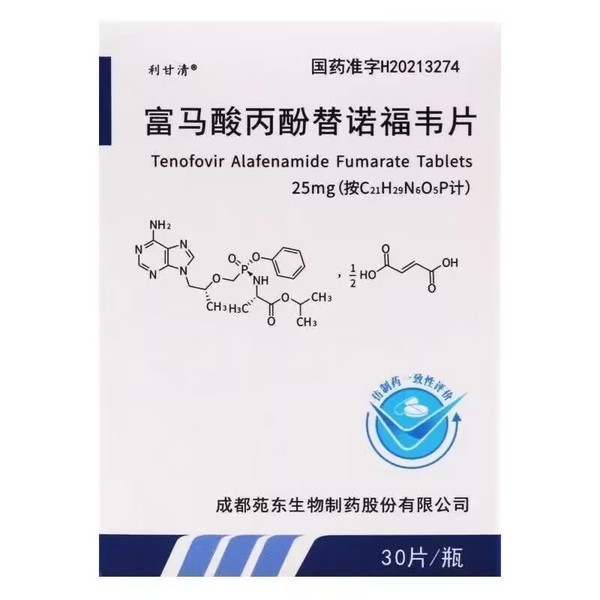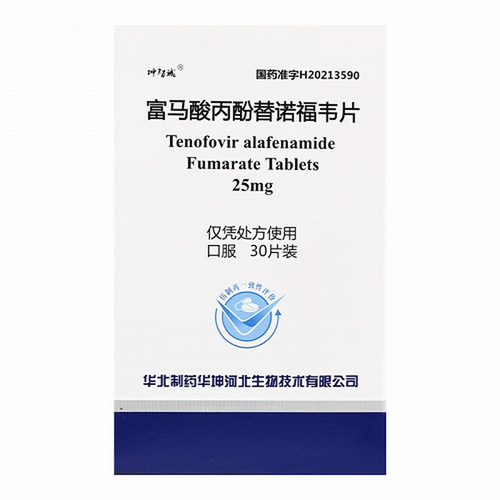Product Overview
[Drug Name]
Generic Name: Tenofovir Alafenamide Fumarate Tablets
Trade Name: LiGanQing FuMaSuanBingFenTiNuoFuWei Tablets 25mg (Calculated as C21H29N6O5Pi) * 30 Tablets
Pinyin Code: LiGanQing FuMaSuanBingFenTiNuoFuWeiPian 25mg (AnC1H29N6O5PJi) * 30 Tablets
[Main Ingredients]
The main ingredient of this product is tenofovir alafenamide fumarate. Chemical name: Propan-2-yl N-[(S)-([(2R)-1-6-amino-9H-purin-9-yl)propan-2-yl]-oxy)methyl)(phenoxy)phosphoryl]-|-alanine ester, (2E)-but-2-enedioic acid (21) Molecular formula: C21H29O5N6P-2(C4H404) Molecular weight: 534.5
[Properties]
This product is a film-coated tablet, which appears white or off-white after removing the coating.
[Indications/Main functions]
It is suitable for the treatment of chronic hepatitis B in adults and adolescents (aged 12 years and above, weighing at least 35 kg) (see [Pharmacology and Toxicology]).
[Specifications]
25 mg (calculated as C21H29N6O5P)*30 tablets
[Usage and Dosage]
Treatment should be initiated by a physician with experience in the management of chronic hepatitis B. Adults and Adolescents (ages 12 years and older and weighing at least 35 kg): Take one tablet once daily. Orally. Take with food. Missed Dose: If a dose is missed and less than 18 hours have passed since the usual time of dosing, the patient should take a dose as soon as possible and resume the usual dosing schedule. If more than 18 hours have passed since the usual time of dosing, the patient should not take the missed dose and resume the usual dosing schedule. If the patient vomits within 1 hour of taking the dose, the patient should take another tablet. If the patient vomits more than 1 hour after taking the dose, the patient does not need to take another tablet. Special Populations: Elderly: No dose adjustment is required for patients aged 65 years and older (see [Pharmacology and Toxicology]). Renal Impairment: No dose adjustment is required for adults or adolescents (age at least 12 years and weighing at least 35 kg) with an estimated creatinine clearance (CrC) ≥ 15 mL/min or for patients with a CrC < 15 mL/min who are receiving hemodialysis. On the day of hemodialysis, the drug should be administered after the completion of hemodialysis treatment (see [Pharmacology and Toxicology]). No dosage recommendation is available for patients with CrCl <15 mL/min who are not receiving hemodialysis (see [Pharmacology and Toxicology]). Hepatic Impairment: No dose adjustment is required for patients with hepatic impairment (see [Precautions] and [Pharmacology and Toxicology]). Pediatric Population: The safety and efficacy of tenofovir disoproxil fumarate tablets have not been established in children under 12 years of age or weighing <35 kg. No data are available.
[Adverse Reactions]
See the package insert for details.Hypersensitivity to the active ingredient or any of the following excipients: alpha-lactose, microcrystalline cellulose, croscarmellose sodium, magnesium stearate, polyvinyl alcohol, titanium dioxide, polyethylene glycol, talc, and iron oxide yellow.
[Precautions]
1. Hepatitis Exacerbation Warning: Acute exacerbations of hepatitis (usually associated with elevated plasma HBV DNA levels) have been reported in patients who discontinue hepatitis B treatment. Most cases are self-limited, but severe exacerbations (including fatal outcomes) may occur after discontinuation of hepatitis B treatment. Liver function should be monitored regularly with clinical and laboratory follow-up for at least six months after discontinuation of hepatitis B treatment. Hepatitis B treatment may need to be resumed if appropriate. Discontinuation of treatment is not recommended in patients with advanced liver disease or cirrhosis, as post-treatment exacerbations of hepatitis may lead to hepatic decompensation. In patients with decompensated liver disease, liver flares are particularly severe and sometimes fatal. Spontaneous exacerbations of chronic hepatitis B are relatively common during treatment and are characterized by transient increases in serum alanine aminotransferase (ALT). Some patients may experience increases in serum ALT after initiating antiviral therapy. In patients with compensated liver disease, these increases in serum ALT are typically not accompanied by increases in serum bilirubin concentrations or hepatic decompensation. Patients with cirrhosis may be at increased risk of hepatic decompensation following an exacerbation and should therefore be closely monitored during treatment. 2. HBV Transmission: Patients must be informed that Tenofovir Alafenamide (TFV) tablets do not prevent the risk of HBV transmission through sexual contact or blood contamination. Appropriate preventive measures must continue. 3. Patients with Decompensated Liver Disease: There are no safety and efficacy data for this product in patients with decompensated liver disease and HBV infection with a Child-Pugh-Turcotte (CPT) score >9 (i.e., Class C). These patients may be at increased risk for severe hepatic or renal adverse reactions. Therefore, hepatobiliary and renal indicators and parameters should be closely monitored in this patient population (see [Pharmacology and Toxicology]). 4. Lactic Acidosis/Severe Hepatomegaly: Lactic acidosis and severe hepatomegaly, including fatal cases, have been reported with nucleoside analogs (including tenofovir disoproxil fumarate or other tenofovir prodrugs) alone or in combination with other antiretroviral drugs. Treatment with this drug should be withheld in any patient whose clinical or laboratory findings suggest lactic acidosis or significant hepatotoxicity (which may include hepatomegaly and steatosis, even in the absence of significant transaminase elevations). 5. Patients with Renal Impairment (CrCl <30 mL/min): The use of this drug once daily in patients with CrCl ≥15 mL/min but <30 mL/min and in patients with CrCl <15 mL/min undergoing hemodialysis is based on very limited pharmacokinetic data and modeling and simulation. There are no safety data for this drug in HBV-infected patients with CrCl <30 mL/min. This drug is not recommended for patients with CrCl <15 mL/min who are not undergoing hemodialysis (see [Dosage and Administration]). 6. Nephrotoxicity: The potential risk of nephrotoxicity from long-term exposure to low levels of tenofovir alafenamide cannot be ruled out (see [Pharmacology and Toxicology]). 7. Patients Co-infected with HBV and Hepatitis C or D Virus: There are no data on the safety and efficacy of this product in patients co-infected with hepatitis C or D Virus. Co-administration guidelines for the treatment of hepatitis C should be followed (see [Drug Interactions]). 8. Hepatitis B and HIV Co-infection: Due to the risk of HIV drug resistance, this product is not recommended for the treatment of HIV-1 infection. The safety and efficacy of this product in patients co-infected with HIV-1 and HBV have not been established. Before initiating treatment with this product, all HBV-infected patients should undergo HIV antibody testing. If positive, the appropriate antiretroviral combination regimen recommended for patients co-infected with HIV-1 should be used. 9. Combination with Other Medications: This product should not be used in combination with products containing tenofovir alafenamide, tenofovir disoproxil fumarate, or adefovir dipivoxil. 10. Lactose Intolerance: This product contains alpha-lactose. Therefore, patients with galactose intolerance, Lapp lactase deficiency, or the rare genetic problem of glucose-galactose malabsorption should not take this medicine. 11. Effects on the ability to drive and operate machinery This product has no or negligible effect on the ability to drive and operate machinery. Patients should be informed that dizziness has been reported during treatment with this product.







